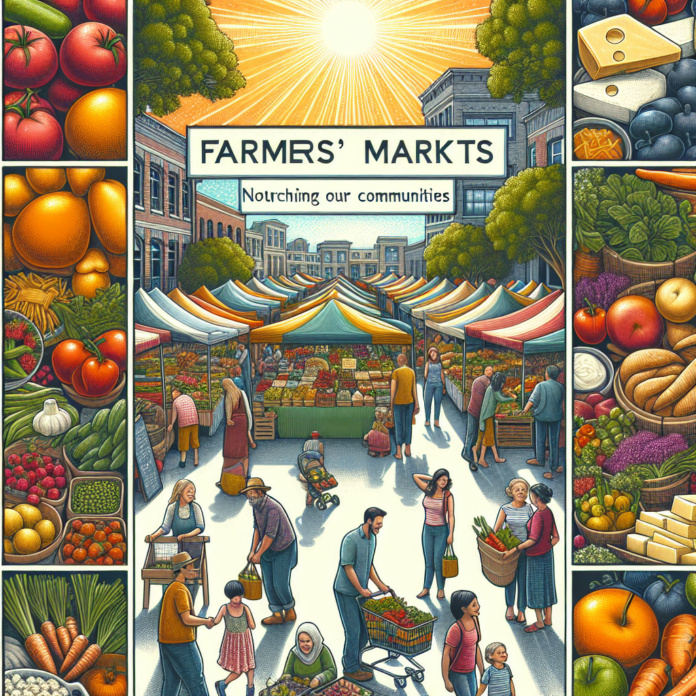As we deliberate on the sustainability of our food systems in the face of increasing population numbers and environmental changes, we inevitably swing our gaze in the direction of farmers’ markets. The thriving hub of local growers and businesses, farmers’ markets offer more than just a place to buy fresh groceries, they form an integral part of our communities, bolstering local economies, promoting physical health, and fostering a sense of community.
The Local Economic Impact
Farmers’ markets provide an important economic outlet for our local farmers and food entrepreneurs. By eliminating the middlemen and reducing the necessary transportation and storage, growers are able to retain full profit from their sales, directly fueling the local agricultural economy. The dollars spent within these markets circulate within the community, contributing to the upkeep of local services and infrastructure.
A study conducted by the American Farmland Trust found for every $100 spent at a farmers’ market, $62 stays in the local economy and $99 stays within the state. In contrast, buying from non-locally owned businesses only keeps about $43 within the local community. Also, farmers’ markets foster entrepreneurship by providing small businesses with low entry costs and a ready customer base. Through such platforms, these businesses can establish themselves, perfect their trade, and possibly expand beyond the market.
A Healthier Population
From a health perspective, farmers’ markets offer vast arrays of fresh, nutritional foods often harvested within 24 hours of your purchase. The proximity of farm to table not only ensures optimal flavor and freshness but also optimum nutrition as the time for nutrients to diminish is drastically reduced. More so, the availability of a wide variety of fruits, vegetables, and other products encourage diversified eating, encompassing a wider range of nutrients and hence healthier populations.
Interestingly, farmers’ markets potentially cater to healthier populations too. According to a survey by the Farmers Market Coalition, people who shop at farmers’ markets have 15 to 20 more social interactions per visit than supermarket shoppers. Such interactions along with the physical activity involved in market visits contribute to mental well-being. Considering the growing mental health problem in our societies today, such benefits are not to be understated.
A Fostering Sense of Community
Farmers’ markets foster more than just a location for buying and selling. They represent a spot where community members can engage with each other, share experiences, learn about their food, and create bonds. They can communicate directly with the farmers, learning about how their food was grown, the farmer’s practices and, perhaps, even pick up a few tips on how to prepare their purchases. Such intimacy breeds trust and strengthens community solidarity.
Furthermore, farmers’ markets often become community events. Entertainment in the form of live music, cooking demonstrations, and activities for children occur frequently. These events not only make shopping more enjoyable, but they also create a vibrant community atmosphere where individuals and families can have fun.
Conclusion
Farmers’ markets are more than just a trendy spot to grab your weekly greens. They are proving to be invaluable as drivers of local economic growth, intertwined with our health, and as a linchpin in our communities. The benefits of farmers’ markets are vast and far-reaching – from the healthfulness of fresh, local produce to an enriched sense of community. Looking ahead, as we continue to seek sustainable solutions for our food systems, it is hopeful, indeed crucial, that farmers’ markets will take up an even more foreseeable role in our vision.
Frequently Asked Questions
1. Why are farmers’ markets important for local economies?
Farmers’ markets eliminate the middle person and reduce necessary transportation and storages, which allows farmers to retain full profits from their sales. This directly fuels the local economy as the majority of the money spent at these markets stays within the community.
2. How do farmers’ markets contribute to healthier populations?
Farmers’ markets offer fresh, locally-grown products that are packed with nutrients. Such produce encourages residents to diversify their eating habits, which leads to a healthful diet and a healthier population.
3. How do farmers’ markets foster community?
Farmers’ markets provide communal spaces where individuals can engage with each other, share experiences, and learn about their food. They often become community events with music, cooking demos, and children’s activities, creating a vibrant community atmosphere.

